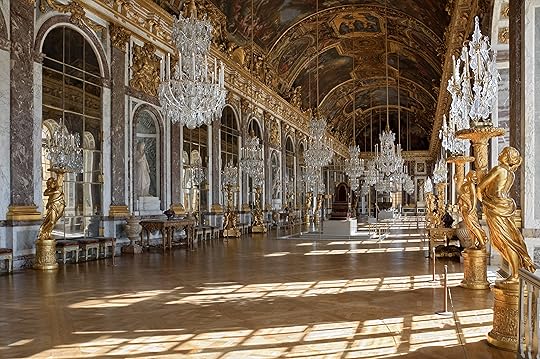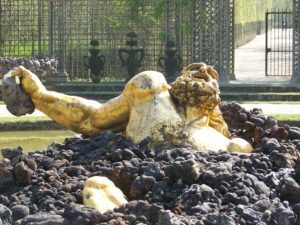The Veracity of Versailles

The Palace of Versailles sits a mere thirteen and a half miles (22 kilometers) from Paris proper. It is an easy train ride and fascinating day trip for any visitor. Five million people enter the chateau each year and double that number stroll the gardens. There is no place on earth that matches its grandeur, perhaps fitting for the legacy of the longest reigning monarch in European history, Louis XIV. A trip to the former seat of power for the Kingdom of France will have you marveling at a level of vanity and power unmatched in modern history. There’s only one problem–the character of the king responsible for this architectural masterpiece might leave you just a little sick to your stomach.
I have been fortunate enough to visit Versailles on more than one occasion. That’s quite lucky because my first sight of it (at the age of seventeen) blew me away. It was the second castle I’d seen in my life and I was still trying to comprehend that people once lived in such luxury. I was walking in the footsteps of kings, queens, and nobles—but my gilded surroundings were absolutely incompatible with anything that resembled a “home” in my mind. They simply didn’t come in something that measured over seven hundred square feet and included seven hundred rooms. What would someone—anyone—need with sixty-seven staircases and twelve hundred fireplaces?
My seventeen-year-old brain shut down and I labeled it all inconceivable even though I was standing in the undeniable proof of such an existence.
Learning about Le Roi Soleil (the “Sun King”), as I studied French was little more than memorizing dates, artworks, and artists. There was no subtext to the man who ruled his court with an iron hand. Yes, I was clear on the fact that Louis XIV is the leading global example of “absolute monarchy.” I also understood that he had spent immeasurable sums of money converting his father’s hunting lodge to the landmark it is today and in the process angered both his court and populace. But how bad could it be if he never had to pay the price for such extravagance. We’d have to ask Marie Antoinette about that one.
Last year, French television company Canal+ partnered with the BBC to create the most expensive French program ever aired. The gorgeous clothes, the elaborate games and entertainment—all in HD in their backstabbing glory for us to witness, providing more context for this king than anything I’ve ever seen. Simply titled, Versailles, it provides more clues to the danger involved with being in the king’s favor, let alone being out of it. It is said that Louis XIV earned his nickname by comparing himself to the sun—he believed the state could not survive without him. Other legend has it that the name was given to him by his courtiers who declared how warm it was in the king’s embrace and how very cold were those left out of it.
To imagine the life and mind of Louis XIV, envision a court numbering five thousand people—every one of them constantly vying for his favor. To control them, he demanded that they spend time at Versailles every year. With regularity, he also demanded they buy entire new wardrobes of the finest French couture at their expense. No less than one hundred people were called on to attend his daily Levee, which included him waking, having breakfast, bathing and dressing. If you were the absolute favorite, you were in attendance for the Grand Entrée and designated as the man to hand him his shirt. At the evening meal, an average of twenty-eight dishes were prepared and served.
Here we have the ingredients for seventeenth century “office politics”—only you weren’t free of your competition when you went home at night. Instead, your enemies—seething with ambition and jealousy—might be installed in the apartment right next to yours. It is an established fact that the nobles fought over the rights to neighboring apartments to keep their allies close. The only upside of residing at Versailles was that you had easy access to the latest news and gossip. All of which could be used as leverage against your adversaries! Jostling for position was constant during the fifty-two-year building project that transformed a somewhat modest hunting lodge into a monumental seat of power. Sounds like fun, doesn’t it?
Today, everyone can witness the extravagance Louis thought himself entitled to. The Hall of Mirrors (Le Galerie des Glaces) is one of the more striking examples. When the palace was under construction from 1661-1715, mirrors were one of the most expensive possessions one could own. The Venetians had a monopoly on the trade secrets of their creation and did not willingly or cheaply divulge them. Regardless, the French Finance Minister convinced several Venetian artisans to come to France to create and install two hundred and forty feet of mirrors. Venice then sent assassins to kill the artisans so proprietary secrets would be safe. Nothing or no one would stand in the way of the king’s admiring of himself.
Even without entering the King’s former home, you can experience its supreme beauty by visiting the surrounding gardens. Two thousand acres of landscaped French perfection await those who wish to stroll the outward reflection of the Bourbon dynasty. Visit the Orangerie which houses over one thousand plants, many of them orange trees which Louis’ gardeners managed to cajole into blooming year-round. Don’t miss the statue of Enceladus, Bassin d’Encelade (1675), a Giant of Greek mythology. The enormous gilt-bronze statue shows the giant, known for creating earthquakes and volcanic eruption, clawing with massive fists out of his earth-filled tomb—much in the same way Louis clawed through tradition to create his substantial legacy. 
No matter how spend your time during your visit The Palace of Versailles, sensory overload is impossible to escape. A feast for the imagination in every sense of the word, the chateau delivers the sensation of a bygone era. But imagine–just for a moment–a man who believes he absolutely entitled to the best of everything, including (by modern estimates) a two billion dollar expenditure of other people’s people’s money and the unending sacrifice of everyone around him to serve his immense ego. We can hope that the world sees a man like this just once—but unfortunately, history does tend to repeat itself. The responsibility to police it is ours.
The post The Veracity of Versailles appeared first on Worldwise Publications.



